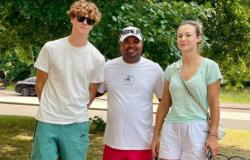The “Office IT training course for surgeons and dentists with artificial intelligence applications” organized by the Order of Doctors of the province of Reggio Calabria in synergy with the University of Mediterranean Studies ended with a day full of events. And it is precisely in the Aula Magna (former Faculty of Engineering) of the same University of Reggio that the medical students, after the visit to the ICare laboratory directed by prof. Giuseppe Araniti, were able to visit the holographic park inside the University of Reggio Emilia. It is, in fact, an advanced multidisciplinary research laboratory at the DIIES Department of the same University whose working group conducts, among other things, “activities aimed at testing innovative technologies to support the development of telemedicine services”
“I would first of all like to thank doctor Antonino Zema, coordinator of the Training and Update Commission of the Order itself – begins doctor Pasquale Veneziano, president of the Order of Doctors – who had an excellent intuition in organizing this course which is so important for the training of those who work in healthcare, increasingly looking towards a future that sees it in symbiosis with new technologies and artificial intelligence. Thanks extend to the engineer Maurizio Campolo and the doctor Giandomenico Posillipo for the great availability shown, thus contributing to the excellent performance of the course. On the other hand – continues President Pasquale Veneziano – the Medical Association could not avoid organizing something, such as topics regarding artificial intelligence, which day after day reveal themselves to be of great importance in their application in medicine. Here, therefore, is the need to update colleagues on the possibilities that these new technologies can have in the field of general medicine, for advanced radiological diagnostics and in the surgical field. I also congratulate the DIIES Department of the Mediterranean University for its highly qualified laboratory and the holographic park which demonstrate how far our University is in the study of these innovative methods applied to medicine.
But it is the director of the laboratory himself, Professor Giuseppe Araniti, who explains the objectives of a laboratory already projected into the future.
“We have created a 5G network architecture within the Department to have fast communications, preparatory to being able to test holographic communications that can have different uses in different fields – explains the Professor – and one of these is telemedicine. The Laboratory and the Park were created thanks to a regional fund that financed applications specifically in this area. Through the holographic park – highlights Professor Giuseppe Araniti – it is possible to do, for example, telepresence: the doctor can appear in a certain position, physically, in another place, either to carry out a televisit or teleconsultation or to carry out mentoring’, that is, lessons. In the sense that he could see a hologram and therefore an organ, for example a heart or a lung, and through advanced technologies project a CT scan, perhaps rotating it, and all this during an operation. And this is precisely what we are experimenting with in the laboratory. Therefore, producing 3D volumes that can be people or even organs with the precise aim of helping doctors during the various activities, both televisits and telesurgery”.
For Maurizio Campolo, technical manager of the AI_Lab university artificial intelligence laboratory of the Mediterranea, “the classic basic course for IT (the Office package) has been integrated by notions of computer security with a focus on offices, laboratories and departments in where the collection of information can determine the attractiveness of external agents. Phishing, social engineering and well-known and lesser-known deceptions were discussed with several examples deriving from objective and real elements. The professionals (both doctors and dentists) participated with enthusiasm and with various questions, often deriving from doubts and real situations, revealing a grain of truth: the difficulties in which healthcare personnel operate from an organizational/management point of view. I believe that the added value this year – underlined the engineer Maurizio Campolo – was to present Artificial Intelligence as a support to professionals. We discovered how to get help in implementing synthetic forms of presentations relevant to the healthcare world, creating images with groups of elements and objects that would otherwise be unthinkable, captivating and free from copyright constraints. A few hours dedicated to AI not only as applications (see big brands) and University (Reggio Calabria can boast two international research laboratories, AI-Lab and NeuroLab directed by Prof. Carlo Morabito) but cutting out part of the time to recognize the dark sides of misinformation conveyed in a social society. I am particularly pleased with the participation and the results obtained: intrigued professionals. And to satisfy these curiosities, it was decided to add as a further training element, a visit to the iCare laboratory directed by prof. Giuseppe Araniti. An experience in the world of Holograms and Digital Twin on a 5G basis with Telemedicine applications”.
“There is a lot of talk about moving forward in this interesting field of IT training with artificial intelligence applications – adds Doctor Antonino Zema, coordinator of the Training and Update Commission of the Order itself – and I must say that this course was really very important. We will certainly do others to obtain maximum benefits by applying all this new knowledge in the field of healthcare. Furthermore, artificial intelligence is already revolutionizing various sectors around the world, including medicine.”
For Latest Updates Follow us on Google News






